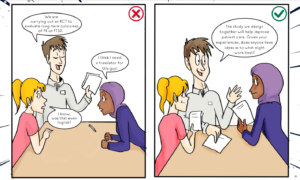Dr. Bhanu Prasad and his research team are conducting a feasibility study of a randomized controlled trial investigating renal denervation as a possible treatment option in patients with Loin Pain Hematuria Syndrome (LPHS). Dr. Prasad presented this study at the CNTN meeting in November 2019 in Washington, D.C and we look forward to hearing more about the study at future CNTN meetings.
Loin Pain Hematuria Syndrome (LPHS) is a poorly understood clinical condition characterized by severe pain localized to the kidney but in the absence of identifiable urinary tract disease. Case reports/series have shown renal denervation via catheter-based radiofrequency ablation to be an effective therapeutic option for the treatment of LPHS. To determine whether catheter-based renal denervation is a meaningful addition to the treatment options in these often difficult to treat LPHS patients, a randomized clinical trial is needed. Prior to conducting a definitive trial that focuses on patient outcomes, ensuring the feasibility of undertaking such a trial is required. As such, we will conduct a single-centre randomized control feasibility trial designed to determine viability and provide framework and direction for a larger trial.
The research team will conduct a double-blinded, parallel-group, partial crossover, sham-controlled, randomized feasibility trial on 10 LPHS patients at the Regina General Hospital, Saskatchewan. Participants will be randomized into either renal denervation (treatment group) or a sham treatment (control group). Data (pain, quality of life, mood, disability) will be collected from both groups at baseline, 6 weeks, 3 and 6 months after the intervention. After the initial 6-month follow-up is over, the participants who received the sham procedure will cross over into the treatment group and will be followed for an additional 6 months in the same manner as the treatment group.
The lessons learnt from this trial will lay the framework and direction for conducting a multi-site randomized controlled trial involving a larger cohort of patients.




 Rita Suri, member of the Scientific Operations and Executive committees, will be the chair of the CSN Scientific committee.
Rita Suri, member of the Scientific Operations and Executive committees, will be the chair of the CSN Scientific committee. Amber Molnar, co-chair of the Communications and Engagement committee, will be representing the province of Ontario on the CSN board.
Amber Molnar, co-chair of the Communications and Engagement committee, will be representing the province of Ontario on the CSN board. Bhanu Prasad, member of the Communications and Engagement committee, will be the chair of the CSN Community Nephrology committee.
Bhanu Prasad, member of the Communications and Engagement committee, will be the chair of the CSN Community Nephrology committee.